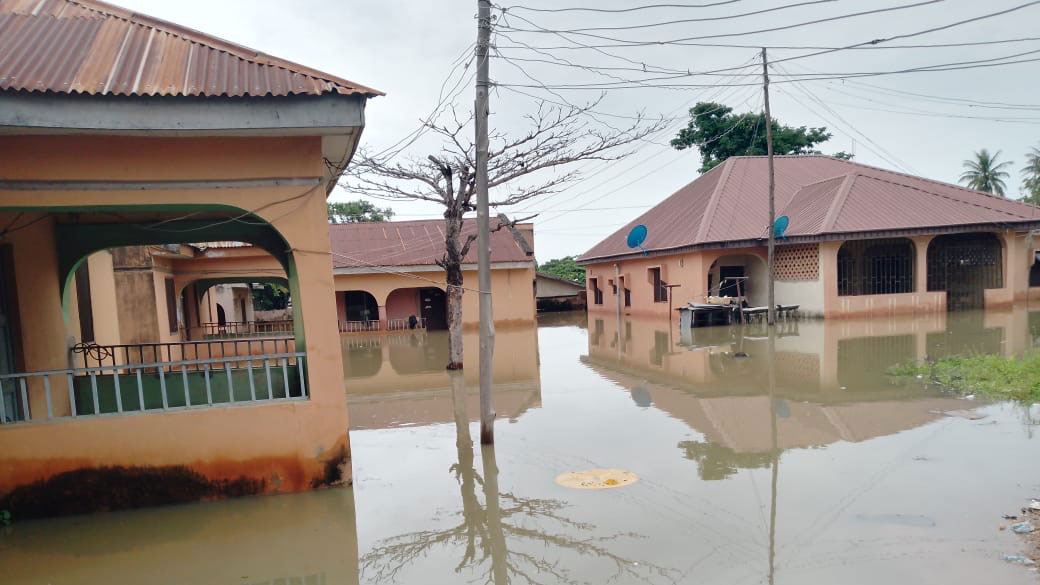FEATURED
Checking Devastating Effects Of Climate Change As The Rains Peak

BY ROLAND OGBONNAYA
There has been heightened tension in some parts of the country as the heavens open and pours heavily in recent times. As the rainy season peaks, one cannot forget the devastating effects it has in some parts of the country and the link to climate change.
Climate change is having a significant impact on Nigeria, with devastating effects on the environment, public health, and the economy. Climate change refers to long-term changes in weather patterns and atmospheric conditions that are primarily caused by human activities, such as burning fossil fuels and deforestation.
One of the most significant effects of climate change in Nigeria is the increase in temperature, which has resulted in droughts, wildfires, and heat waves. The rise in temperature is also leading to the melting of glaciers and the polar ice caps, which is causing a rise in sea levels and increased flooding in coastal areas.
In Nigeria, this has led to the displacement of communities, the destruction of homes and communities, and the loss of life. Another devastating effect of climate change in Nigeria is the negative impact it is having on agriculture. The country relies heavily on farming for food production and export, and changing weather patterns are making it increasingly difficult for farmers to predict planting and harvesting times.
This, in turn, has resulted in lower crop yields, food shortages, and increased prices. In rural areas, the impact of climate change is particularly severe, with communities struggling to adapt to changing weather patterns and a lack of access to resources. The health effects of climate change in Nigeria are also significant and far-reaching.
Increased temperatures are leading to the spread of diseases such as malaria and dengue fever, and the rise in sea levels is causing a surge in cases of waterborne diseases. The country is also facing an increase in respiratory illnesses and deaths due to the burning of fossil fuels, which contributes to air pollution that, in turn, can cause respiratory and heart issues.
The energy sector is another area where Nigeria is feeling the devastating effects of climate change. The country has long relied on the use of fossil fuels for power generation, which contributes significantly to greenhouse gas emissions. As the world moves towards renewable energy sources, Nigeria is being left behind, putting the country’s economy at risk.
As other countries invest in renewable energy technologies, Nigeria risks falling behind in the global energy market, which could have enormous economic implications for the country. In conclusion, climate change is having a devastating impact on Nigeria. The country must take immediate action to mitigate the effects of climate change and invest in sustainable technologies to build a more resilient economy.
The negative impact of climate change on the environment, public health, and the economy is a serious issue that requires urgent action from all policymakers and citizens. It is essential to promote public awareness and present solutions to limit greenhouse gas emissions and mitigate the effects of climate change.
There are several ways to check the devastating effects of climate change in Nigeria. Some of these include conducting research studies. Researchers can conduct studies to analyse the impact of climate change on different sectors such as agriculture, health, and the environment.
This can help policymakers develop evidence-based policies and strategies to mitigate the negative effects of climate change. Implementing mitigation strategies. Mitigation strategies such as transitioning to renewable energy sources and reducing greenhouse gas emissions through carbon capture and storage can help reduce the effects of climate change.
Improving sustainable practices is key. Adopting sustainable practices such as reforestation programs, improved waste management, and reduced deforestation can help to mitigate the devastating effects of climate change in Nigeria. Also important is the promotion of public awareness. Raising public awareness about the effects of climate change and educating people on how they can reduce their carbon footprint can help to reduce the negative impact of climate change.
Building climate resilience has further been identified in mitigating the effects of climate change. Developing resilience is key to adapting to the ever-changing climate. Activities such as investments in climate-resilient infrastructure (e.g. flood defenses), early warning systems, and drought-resistant crops can help build resilience to extreme weather events.
However, it’s important to address the devastating effects of climate change in Nigeria as they pose a serious threat to the environment, public health, and the economy. By addressing these effects through research, mitigation strategies, sustainable practices, education, and building climate resilience, Nigeria can help minimise the impact of climate change and create a more sustainable future for generations to come.
- Ogbonnaya is a journalist based in Lagos
-
CRIME4 years ago
PSC Dismisses DCP Abba Kyari, To Be Prosecuted Over Alleged $1.1m Fraud
-
FEATURED4 years ago
2022 Will Brighten Possibility Of Osinbajo Presidency, Says TPP
-
FEATURED2 years ago
Buhari’s Ministers, CEOs Should Be Held Accountable Along With Emefiele, Says Timi Frank
-
BUSINESS & ECONOMY2 years ago
Oyedemi Reigns As 2023’s Real Estate Humanitarian Of The Year
-
SPORTS2 years ago
BREAKING: Jürgen Klopp Quits Liverpool As Manager At End Of Season
-
SPORTS2 years ago
Could Liverpool Afford Kylian Mbappe For €200 million? Wages, Transfer Fee
-
ENTERTAINMENT2 years ago
Veteran Nigerian Musician, Basil Akalonu Dies At 72
-
FEATURED2 years ago
Tribunal Judgement: Peter Obi Warns Of Vanishing Electoral Jurisprudence, Heads To Supreme Court
-
BUSINESS & ECONOMY2 years ago
Oyedemi Bags ‘Next Bulls Award’ As BusinessDay Celebrates Top 25 CEOs/ Business Leaders
-
FEATURED4 years ago
2023 Presidency: South East PDP Aspirants Unite, Demand Party Ticket For Zone



































